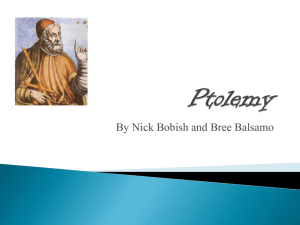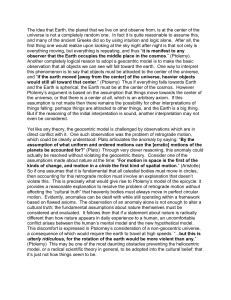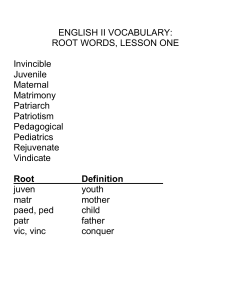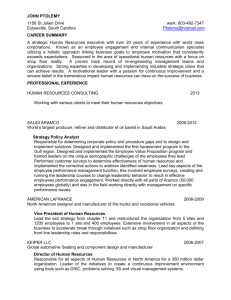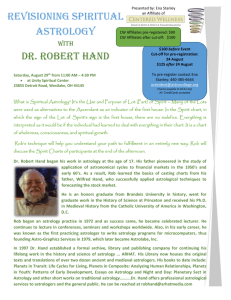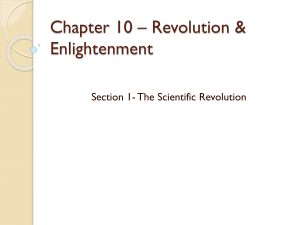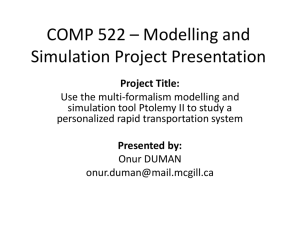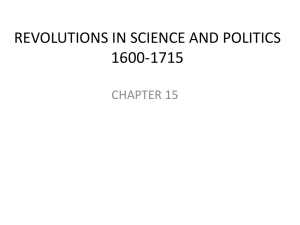US ASTRONOMY, ASTROLOGY, PTOLEMY, AND __________________________________________________________ SPECIALTOPICS
advertisement
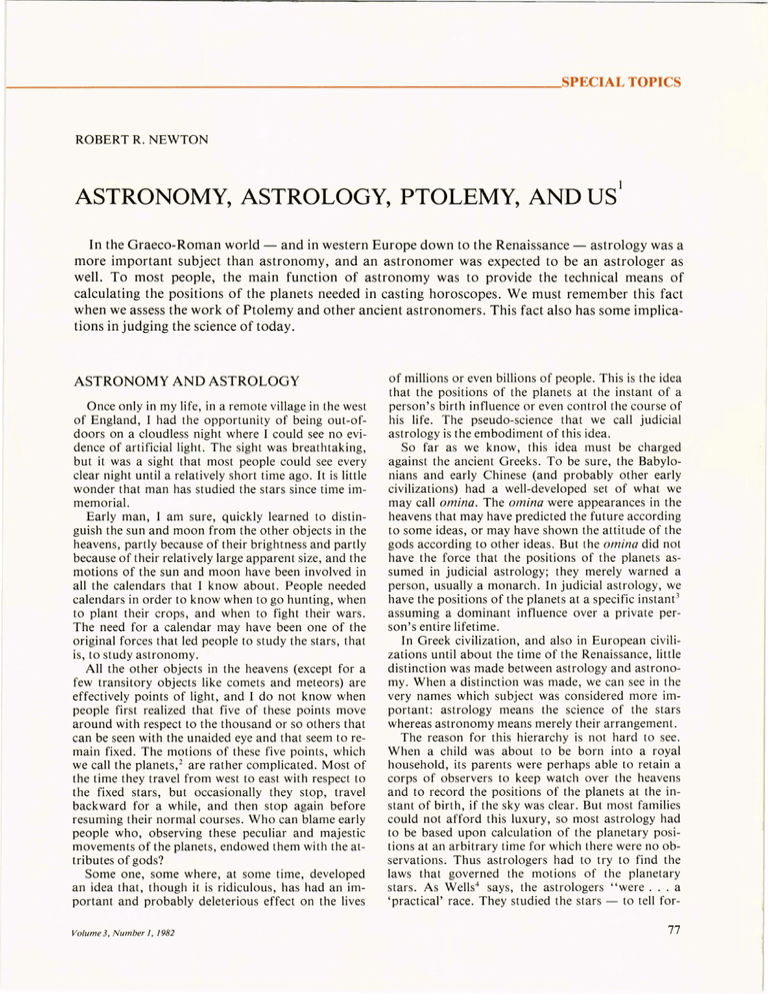
__________________________________________________________SPECIALTOPICS ROBERT R. NEWTON ASTRONOMY, ASTROLOGY, PTOLEMY, AND US l In the Graeco-Roman world - and in western Europe down to the Renaissance - astrology was a more important subject than astronomy, and an astronomer was expected to be an astrologer as well. To most people, the main function of astronomy was to provide the technical means of calculating the positions of the planets needed in casting horoscopes. We must remember this fact when we assess the work of Ptolemy and other ancient astronomers. This fact also has some implications in judging the science of today. ASTRONOMY AND ASTROLOGY Once only in my life, in a remote village in the west of England, I had the opportunity of being out-ofdoors on a cloudless night where I could see no evidence of artificial light. The sight was breathtaking, but it was a sight that most people could see every clear night until a relatively short time ago. It is little wonder that man has studied the stars since time immemorial. Early man, I am sure, quickly learned to distinguish the sun and moon from the other objects in the heavens, partly because of their brightness and partly because of their relatively large apparent size, and the motions of the sun and moon have been involved in all the calendars that I know about. People needed calendars in order to know when to go hunting, when to plant their crops, and when to fight their wars. The need for a calendar may have been one of the original forces that led people to study the stars, that is, to study astronomy. All the other objects in the heavens (except for a few transitory objects like comets and meteors) are effectively points of light, and I do not know when people first realized that five of these points move around with respect to the thousand or so others that can be seen with the unaided eye and that seem to remain fixed. The motions of these five points, which we call the planets, 2 are rather complicated. Most of the time they travel from west to east with respect to the fixed stars, but occasionally they stop, travel backward for a while, and then stop again before resuming their normal courses. Who can blame early people who, observing these peculiar and majestic movements of the planets, endowed them with the attributes of gods? Some one, some where, at some time, developed an idea that, though it is ridiculous, has had an important and probably deleterious effect on the lives Volume 3, N umber 1, 1982 of millions or even billions of people. This is the idea that the positions of the planets at the instant of a person's birth influence or even control the course of his life. The pseudo-science that we call judicial astrology is the embodiment of this idea. So far as we know, this idea must be charged against the ancient Greeks. To be sure, the Babylonians and early Chinese (and probably other early civilizations) had a well-developed set of what we may call omina. The omina were appearances in the heavens that may have predicted the future according to some ideas, or may have shown the attitude of the gods according to other ideas. But the omina did not have the force that the positions of the planets assumed in judicial astrology; they merely warned a person, usually a monarch. In judicial astrology, we have the positions of the planets at a specific instant 3 assuming a dominant influence over a private person's entire lifetime. In Greek civilization, and also in European civilizations until about the time of the Renaissance, little distinction was made between astrology and astronomy. When a distinction was made, we can see in the very names which subject was considered more important: astrology means the science of the stars whereas astronomy means merely their arrangement. The reason for this hierarchy is not hard to see. When a child was about to be born into a royal household, its parents were perhaps able to retain a corps of observers to keep watch over the heavens and to record the positions of the planets at the instant of birth, if the sky was clear. But most families could not afford this luxury, so most astrology had to be based upon calculation of the planetary positions at an arbitrary time for which there were no observations. Thus astrologers had to try to find the laws that governed the motions of the planetary stars. As Wells 4 says, the astrologers "were ... a 'practical' race. They studied the stars - to tell for- 77 tunes. They lacked that broader faith and understanding which induced men simply to study the stars. " Thus we have seen two reasons why "practical" people might have studied the stars and begun the development of what we now call astronomy. One was to develop a calendar and the other was to supply the celestial positions needed for judicial astrology. As I said a moment ago, little distinction was made between astrology and astronomy in western society until roughly the time of the Renaissance, and an astronomer was expected to be an astrologer as well. We may imagine that many astronomers were happy with this arrangement, but I suspect that others were not. Besides the "practical" people, I suspect that there have always been people who studied a subject such as astronomy purely out of curiosity. That is, there were people who did have the faith "simply to study the stars." CLAUDIUS PTOLEMY We do not know much about Ptolemy's life. His first name seems to be Greek and his second name Egyptian. There is no reason to connect him with the royal line of Ptolemys who were at least the nominal rulers of Egypt for some time; he may have carried the name Ptolemy because he came from one of the towns in Egypt that were named after the royal line. However, all statements to this effect are late and unsupported by any real evidence. There is a standard "portrait" of Ptolemy that is sometimes printed, and there is also a standard description of his physical appearance. These are late creations with no validity. Ptolemy wrote extensively on many subjects, but the work for which he is most famous today is ' E Mathematike Syntaxis, 5 which I shall refer to simply as the Syntaxis. This is a lengthy treatise on astronomy that is divided into 13 books, each of which is divided into parts that are called chapters in most modern writing on Ptolemy. 6 In the Syntaxis, Ptolemy refers to the emperors Hadrian (emperor from AD 117 to 138) and Antoninus Pius (emperor from 138 to 161). In addition, he claims to have made certain astronomical observations, with dates ranging from 127 March 26 to 141 February 2. (It is standard practice when writing dates in astronomy to put the year first, then the month, and then the day of the month.) I have shown elsewhere 7 that all these observations were fabricated, so the dates themselves do not supply a rigorous dating of Ptolemy's activities. Still, he must have wanted the Syntaxis to be read as soon as possible after he finished it, and thus he would presumably have used dates that would be plausible. That is, the dates furnish a rough indication of the time when he wrote the Syntaxis, even though the observations with those dates were fabricated. To say that he finished it about 142 is a reasonable guess. Some later writers have claimed that Ptolemy lived into the reign of Marcus Aurelius, who was emperor 78 from 161 to 180. This is plausible, but there is no evidence that it is correct. Ptolemy says in several places that he made his observations in Alexandria, and this is the only place name that he mentions in respect to himself. However, some manuscripts of his works have an insertion that says that an inscription was dedicated to him in the town of Canopus in the tenth year of Antoninus Pius, thus in about 148. The inscription presumably contained lists of astronomical parameters taken from the Syntaxis. Canopus, whose modern name is Abukir, 8 is a seaport that is much older than Alexandria and that lies about 20 kilometers to the northeast. It was the base for a Roman fleet in imperial times, and it was renowned in the Roman world for the dissolute and licentious nature of its life. On the basis of the manuscripts that refer to the "Canopic inscription," some historians have concluded that Ptolemy lived and worked in Canopus rather than in Alexandria. Opinions about the Canopic inscription are varied. Neugebauer 9 explicitly takes Ptolemy to be the author of the Canopic inscription, but without drawing any conclusions about his place of residence. Pedersen 10 refers to the "undoubted tradition" that Ptolemy erected an inscription at Can opus and concludes that Ptolemy had some sort of observatory in Alexandria but that he probably did his work, other than making his observations, in Canopus. I I Toomer l 2 doubts that the Canopic inscription was authentic, and he sees no reason to suppose that Ptolemy ever lived or worked anywhere other than Alexandria (in his adult life, that is; he might have been born elsewhere). Toomer's position seems sound to me. Ptolemy wrote many things besides the Syntaxis. Sometime after the Syntaxis he wrote what we may call a popularized version of it called Planetary Hypotheses. He also prepared a work that is usually called Handy Tables in English; this is a collection of tables from which one can find astronomical positions by simple calculations, along with instructions on how to use them. This is basically a collection into one place of the various tables that are scattered throughout the Syntaxis, but with some changes in methodology and with less precision. 13 Ptolemy's other work on astronomy has a title that may be translated as Phases of the Fixed Stars, in which Ptolemy gives tables from which one can find the dates of the first and last visibility of various important stars in the morning and evening, for severallatitudes, along with weather predictions l4 based upon these "heliacal" risings and settings. All these works still survive, but the Handy Tables exists only in a revision made by Theon of Alexandria about 360. 15 Other surviving works include treatises on optics, harmony, and geography; the geography in particular was a famous work. There are also some minor surviving works, and some works that are mentioned by ancient writers but that have been lost. Johns Hopkins APL Technical Digest There is one other important work that still survives. The title of this work means something like Astrological Influences, but it is commonly known even in English by the name Tetrabiblos, from the fact that it is divided into four books. I have not read the Tetrabiblos myself, and the following description is taken from Toomer: 16 In the opening chapters of Book I, Ptolemy defends astrology against the charge that it cannot accomplish what it claims. Among his arguments is one that says that, since the sun and moon have obvious physical effects, all other heavenly bodies must also have significant physical effects. Toomer uses the adjective "ludicrous". to describe Ptolemy's arguments on this point. 17 After the defense of astrology, the rest of the first book explains the technical concepts of astrology. Book II deals with the effects of astrology on the earth in general, such as weather prediction, and the last two books deal with astrological influences on human beings. The Tetrabiblos, like the Syntaxis, the Planetary Hypotheses, and the Handy Tables, is addressed to the unknown Syrus. 18 Pedersen 19 says of the Handy Tables: "There can be no doubt that the tables were composed for the benefit of people who had to perform astronomical calculations in great numbers, but without any high accuracy. Only one class of scientists fulfills these conditions, namely the astrologers." Until astrology began to lose part of its grip on educated Europeans, say about 1600, 20 Ptolemy was more famous for the Tetrabiblos than for the Syntaxis. Of these two works, the Tetrabiblos was the first to be translated into Arabic, into medieval Latin, 21 and into English, and it was also the first to be printed. 22 Most modern writing about Ptolemy emphasizes the Syntaxis and his treatise on geography, while giving only passing mention to his writing about astrology. I think it is time to redress this balance. Ptolemy does not sound to me like an astronomer who is forced by the pressure of the times to cast an occasional horoscope. Instead he sounds like a strong advocate of astrology. We shall even have to ask what his motivation was. Was he primarily an astrologer, who was interested in astronomy only because of the need to calculate celestial positions? Or was he primarily an astronomer, but one who happened to believe in astrology? Or was he perhaps both? I suspect that the latter is the answer, and I shall return to this point in a moment. Gingerich, 23 in the second sentence of his cited paper, gives the following quotation: "I know that I am mortal by nature, and ephemeral; but when I trace at my pleasure the windings to and fro of the heavenly bodies I no longer touch earth with my feet: I stand in the presence of Zeus himself and take my fill of ambrosia, food of the gods." He notes that some of the manuscripts of the Syntaxis open with this quotation, and he then goes on to say: "The epigram seems to place Ptolemy within the long series Volum e 3, N umber 1,1982 of scientists who have tasted the intoxicating pleasure of a splendid theory." I am afraid that this epigram tells us nothing about Ptolemy because it is almost surely not his writing. The key to the situation is that it occurs in only some of the manuscripts. Anyone who has worked with manuscript sources soon discovers that manuscript copyists work by rote. They have to: If they take time to think about the meaning of what they are copying, they work more slowly and hence make less money. They copy everything before them, and leave out nothing except by inadvertence. Probably some admirer of the Syntaxis wrote this rhapsody at the head of his copy, and it was then included in copies made from this one, but it is naturally absent from copies that have a different origin. It is not included as a part of Ptolemy's text by any modern editor or translator that I know of. 24 Thus we do not know from his own writing whether Ptolemy ever "tasted the intoxicating pleasure of a splendid theory" or not. However, aside from his manifest interest in astrology, we have some evidence about Ptolemy's motivations. In a part of Planetary Hypotheses that is lost in the original Greek but that survives in translation, 25 Ptolemy develops a model of the entire universe known to him. In this model, the earth is at the center, with the moon next, then Mercury, Venus, the sun, the remaining planets, and the sphere of the fixed stars. In order to understand the model, we must realize that in ancient times the stars were all considered to be at the same distance from the earth, and that this distance was a constant. All other bodies were at a variable distance from the earth, so that each could be considered to move between two spheres centered on the earth, with different radii. Then, in Ptolemy's cosmology, the maximum distance of the moon equalled the minimum distance of Mercury, and so on out to Saturn. The maximum distance of Saturn equalled the constant distance of the fixed stars. Thus, Ptolemy was able to derive the size of the universe. Distances play no part in astrology, which uses simply the angular positions of the planets. Thus Ptolemy's development of this cosmology was not motivated by astrology. It is likely that he developed it simply for the "intoxicating pleasure" of it. US What does this have to do with us? It tells us, if we need telling again, that people in ancient times were basically the same kind of people that we are, with the same basic motivations that we have. In the Mediterranean culture of the Greeks and Romans, just as in the present-day United States, we can see two extreme kinds of people. One is the practical kind, symbolized by the astrologer; his interest is the practical one of telling the future. The other is the poet, who can "taste the intoxicating pleasure" of a splendid theory or a beautiful painting. A few people 79 belong to one extreme or the other, but most of us, like Ptolemy, are a mixture. Ptolemy is a particularly interesting case, but we must remember that he is nearly unique only in his success, not in his motivation. To start with, he was a practical type who practiced astrology. (Here we must ask: Did he practice astrology to tell the future or to make money by telling the future?) He could also develop an idea with no visible practical application just for the sheer pleasure of developing it. But he was also a thoroughgoing fraud who fabricated data on a wholesale basis for the purpose of proving that his ideas were correct. He proves that one and the same person can be a mixture of the poet, the practical man, and the fraud. Gilbert2 6 tells us that such a mixture is not unusual. In the middle of Act II of The Pirates of Penzance he writes: When the enterprising burglar's not a-burgling, When the cutthroat isn't occupied in crime, He loves to hear the little brook a-gurgling And listen to the merry village chime. But this is not all that the earlier parts of this paper have to tell us about us. As scientists, we like to think that we are entirely objective, but we must recognize that our thinking is hemmed in by the accepted modes of thought of our time. We cannot criticize Ptolemy, or his great predecessor Hipparchus, for practicing astrology. Astrology was part of the accepted thinking of their time. Since Ptolemy felt impelled to defend the bases of astrology, we may assume that some influential people in his time did not accept astrology, but it is clear from history that a major part of the Graeco-Roman society did accept it. A characteristic feature of astrology is that it has no objective evidence to support it. Nonetheless, scientists at least down to the Age of Enlightenment continued to accept ideas that had no objective evidence to support them but that relied ultimately upon the accepted modes of thought in their time. A favorite example of mine is a paper written by Dr. John Arbuthnott in 1710. 27 The title of this paper is "An Argument for Divine Providence, taken from the Constant Regularity Observ'd in the Births of both Sexes." In his paper, Dr. Arbuthnott uses birth records for London covering a period of 82 years and shows that the ratio of male to female births was nearly constant from year to year: about 1.06 at that time and place. He then thinks that he proves that the ratio would not be constant if the sex of a child were determined by chance. Since the ratio is nearly constant, it must be maintained by the continuous and direct intervention of "Divine Providence." The Doctor further proves that "Polygamy is contrary to the Law of Nature and Justice," but I confess that I am unable to follow his reasoning. Are our modes of thought as scientists entirely objective? Or will future generations of scientists discover that we too are limited by our generation's modes of thinking? 80 REFERENCES and NOTES paper is adapted from the first two sections of The Origins oj Ptolemy 's Astronomical Parameters, JHU / APL SR-82-2 (in prepara- I This tion). 2A word that is derived from a Greek word meaning "wanderer." 3I n some systems of judicial astrology, the positions of the signs of the zodiac also had to be considered. 4H. G . Wells, The Outline oj History, Third Edition, The Macmillan Company, New York, p . 731 (1922). 5c. Ptolemy, , E Mathematike Syntaxis (ca. 142). There is an edition with a parallel translation into French by N. B. Halma, Henri Grand Libraire, Paris (1813). There is an edition by J. L. Heiberg in C. Ptolemaei Opera Quae Exstant Omnia, B. G. Teubner, Leipzig (1898). There is a translation of this edition into German by K. Manitius, B. G. Teubner, Leipzig (1913). There is also a translation of Heiberg's edition into English by R . C. Taliaferro in Great Books oj the Western World, Vol. 16, Encyclopaedia Britannica, Inc., Chicago (1952) . 6Until fairly recent times, the term "book" meant about what the term "chapter" means today, and the Syntaxis is not extremely long in spite of containing 13 books. The English translation that was just cited has 465 pages . 7R. R. Newton, The Crime oj Claudius Ptolemy, The Johns Hopkin s Unive rsity Press, Baltim o re and London (1977). 8There is an interesting agreement of names here . Abukir means "Father Kir ," and Kir is a form of the name Cyrus or Syrus. Ptolemy addresses many of his writings, including the Syntaxis , to an unknown perSOlI named Syrus . H owever, the "Kir" for whom Abukir is named is believed to have been a saint of the Coptic Church . If so, there is no significance to the agreement. 90 . Neugebauer, The Exact Sciences in Antiquity, Brown University Press, Providence, R . I. , pp . 195 and 207 (1957). 10 0 . Pedersen , A Survey oj the A lmagest, Odense University Press, Odense, Denmark , p. 12 (1974). II Pedersen makes an amusing but minor slip here. He refers to Can opus as a town " ... which offered better possibilities for a quiet life of st ud y ... " than "nois y" Alexandria. This about a city that was famous in Roman times for its dissoluteness. 12G . J. Toomer , article o n Ptolemy in Dictionary oj Scientific Biography, Vol. XI, Charles Scribner's Sons, ew York, p. 186 (1975). l3See the discussio n of the Handy Tables by Pedersen (op. cit., p. 397ff) . 14Pedersen (op. cit ., p. 406) calls these "ast ro logical weather predictions ." I have not read the work in quest ion , but it seems to me that this judgment may not be justified. For example, the "heliacal rising" of Sirius occurs in July. It is not astrological to predict that this event will be followed by hot su ltry weather in Washington, D.C. In fact , this event is the origin of the term " dog da ys," since Sirius (a Canis Majoris) is also known as the Dog Star. The heliacal risings and settings furnished the easiest way to keep up with the seasons in early societies. 15However, Neugebauer (op. cit., p . 198) says that Theon of Alexandria was the author of the Handy Tables. See Note 18. 16Toomer, op. cit. , p. 198. 17 Pedersen (op. cit., p . 402), on the other hand, describes them as "a n intelligent piece of reasoning ." 18 1 have not consulted the Handy Tables myself, and I am relying on Toomer 's discussion and on Pederse n (op. cit ., p. 397) for the information that the tables are addressed to Syrus. If thi s is correct, it seems to me that this increases the probability that they are due to Ptolem y himself and not to Theon of Alexandria . See ote 15 . 19Pedersen, op. cit., p. 400. 20Several writers say that J onathan Swift rang the death knell of astrology when he wrote his parody Prediction jar the Year 1708 under the pseudonym Isaac Bickerstaff, Esq. I wish this were so. Unfortunately, as the current literature shows us, astrology is still a fervid faith with great numbers of the inhabitants of the United States, and probably of other countries as well. 21S ome authorities say that Boeth ius translated the Syntaxis into ancient Latin in about the year 500. If so, this translation has been lost. 22See Pedersen , op. cit., p. 14 ff and p. 400. 23 0. Gingerich , "Was Ptolem y a Fraud?" Q. J. R . Astron. Soc. 21, 253-266 (1980). 241 n his first footnote, Gingerich writes that "the authorship of the epigram is not completely established ... ," but he cites a paper by Franz Bo ll who "was inclined to attribute it to Ptolemy . . . . " This paper, which I have not consulted, was written in 1921. I see little possibilit y that Ptolem y was the author, and, as I have said in the main text, no modern editor or transla tor includes it as part of the Syntaxis. 25B. R. Goldstein gives an English translation of this part of Planetary Hypotheses in " The Arabic ve rsion of Ptolem y'S planetary hypotheses," Trans. Am. Philos. Soc. 57 , Part 4 (1967). 26W. S. Gilbert , Th e Pirates oj Penzance (1880) . Reprinted in The Complete Plays oj Gilbert and Sullivan, Modern Library, New York. 27J. Arbuthnott, Philos. Trans. R. Soc. London 27 , 186-190 (1710). Dr. Arbuthnott was "physician in ordinary" to Queen Anne and a Fellow of the Royal Society. Johns Hopkins APL Technical Digest
